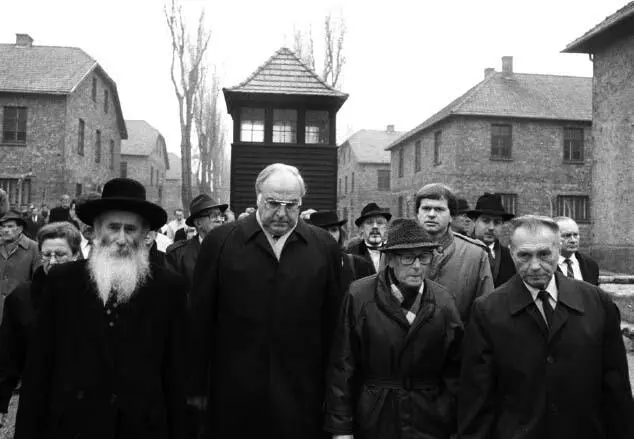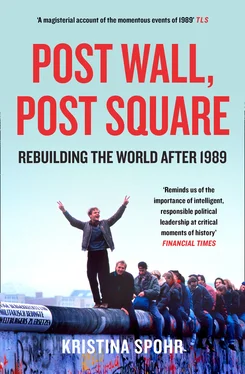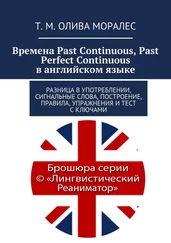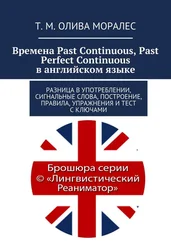
Moment of penitence: Kohl at Auschwitz
Kohl was clearly careful how he spoke publicly about unity, preferring to argue his case around the strict legal principles of the East Germans’ right to self-determination and the provision in the FRG’s Basic Law that unity should be attained through the exercise of the Germans’ free will. Kohl, of course, assumed that when East Germans had the opportunity to choose, they would opt for unification. He had made this point in his state-of-the-nation address on 8 November, before the Wall was breached, and reiterated it at greater length, again in the Bundestag, on 16 November.
‘Our compatriots in the GDR must be able to decide for themselves which way they want to go in the future,’ the chancellor declared. ‘Of course we will respect every decision that is being made by the people of the GDR in free self-determination.’ On the question of economic assistance, he added that this would be useless ‘unless there is an irreversible reform of the economic system, an end to a bureaucratic planned economy and the introduction of a market economy’. In other words, self-determination was in principle entirely free but was also susceptible to a little bribery.
In his speech Kohl made a deliberate nod towards Bonn’s Western allies and their suppressed concerns about a resurgence of German nationalism. ‘We are and remain a part of the Western system of values,’ he insisted, adding that it would be a ‘fatal error’ to slow the process of European integration.[63]
His cryptic statement about ‘Europe’ was, however, insufficient to allay all fears. This became evident when Kohl travelled to Paris for a special dinner of European Community heads of government on 18 November. Mitterrand, then holding the rotating position of president of the EC, had invited his colleagues to the Elysée Palace at very short notice – keen to ensure that the EC 12 would be an active partner for the reforming states of Central and Eastern Europe but without allowing the Community to be deflected from the already ongoing processes of deeper economic and political integration. In particular, the French president worried that, after the drama in Berlin, plans for economic and monetary union (EMU) might no longer take centre stage at the upcoming EC Council meeting in Strasbourg on 8–9 December. He believed that those plans were all the more urgent precisely because of the great transformation sweeping across the Soviet bloc. And he wanted the EC to make this position public well before the Bush–Gorbachev summit talks in Malta on 2–3 December.[64]
Mitterrand therefore had a clear agenda when speaking for ‘Europe’. But, as the leader of France, he was acutely nervous about where Germany was now going. He and Kohl had not met since that epoch-making night of 9 November and he wanted to use the gathering in Paris to talk face-to-face with his German counterpart. They did so, according to Kohl’s memoirs, in a short tête-à-tête before the dinner. Mitterrand avoided mentioning the issue of reunification but Kohl – conscious of what was in the air – raised it himself. ‘I talk to you as a German and as chancellor,’ he said, and then solemnly pledged his active commitment to building Europe. More reflectively, he added: ‘I see two causes for the developments in the East: that the alliance [i.e. NATO] stayed firm thanks to the dual-track decision[65] and the fact that the European Community has evolved in such dynamic fashion.’ Thus, succinctly, he underlined Bonn’s intertwined loyalty to the Western alliance and the European project.[66]
Having put his own cards on the table, Kohl joined Mitterrand for dinner with the other EC leaders. The meal, in one of the opulent salons of the Elysée, went smoothly. Not even a word was ‘whispered’ about unification, Kohl would later recall. Instead Mitterrand went on about the need to support the democratisation processes in the East at large. He argued for constant prudence and against anything that might destabilise Gorbachev. Yet the German question was clearly hanging there, unspoken.
Finally Margaret Thatcher could contain herself no longer. Over dessert she exploded to Kohl: There could be ‘no question of changing Europe’s borders’, which had been confirmed in the Helsinki Final Act. ‘Any attempt to raise this or the issue of German reunification would risk undermining Mr Gorbachev’s position,’ she warned, and would ‘open the Pandora’s box of border claims right through Central Europe’. Kohl was visibly taken aback at her outburst, which upset the whole mood of the dinner. Struggling to respond, he cited a 1970 NATO summit declaration, in which the allies had expressed their continued support on the issue of German unity. Thatcher retorted that this endorsement happened at a time when nobody seriously believed that reunification would ever take place. But Kohl dug in. Be that as may, he said coldly, NATO agreed on this declaration and the decision still stood. Even Thatcher would not be able to stop the German people in their tracks: they now held their fate in their own hands. Sitting back, his ample girth filling the chair, he looked the British prime minister in the eye. Angrily, she stamped her feet several times and shouted: ‘That’s the way you see it, you see it!’[67]
To Kohl it was quite clear that the Iron Lady was determined to uphold the status quo. For her, borders were immutable; even their peaceful change was simply not on the agenda. This also applied to the inner German frontier, which he – like most Germans – did not consider as an international border, never mind the Oder–Neisse frontier with Poland.
Although shaken by Thatcher’s diatribe, Kohl was conscious that her rooted antipathy to the European project meant that she was an outsider in the EC’s decision-making. And she could not play the American card because Kohl was already certain that Bush supported the principle of German unification. What worried Kohl much more was that Mitterrand just sat there quietly, seeming to approve of Thatcher’s words. Had he egged her on? Was this an Anglo-French axis in the making? The chancellor began to wonder whether the French leader was playing a double game.[68]
Only two weeks earlier, Mitterrand had told Kohl in Bonn that he did not fear German reunification. On the other hand, at the end the French president entered the caveat that he would have to consider what in practice worked best in the interests of France and of Europe. There was, in other words, an ambiguity in the French position: Mitterrand thought plenty of time should be allowed for German unification (‘ la nécessaire durée du processus ’), while, simultaneously, the process of creating an ever-closer European union should be speeded up. This double dynamic of largo and accelerando was evidently something that mattered to the Frenchman. And it made the chancellor just a little bit uneasy. But he placed his trust in their history of partnership and cooperation going back to 1982.[69]
Kohl was beginning to realise that the EC, or certainly one of its leading members, was going to demand something in return for going along with his talk about a united Germany. Piecing together their discussions in Bonn and then Paris, he recognised that it was essential to convince Mitterrand of the FRG’s continued commitment to completing European monetary and political union – and not just as a fellow traveller but as a fellow shaper using the power of the Franco-German tandem. This mattered even more because Kohl had no illusions about the coolness felt towards German unification by many Europeans, not least the Italians and the Dutch.
Читать дальше













